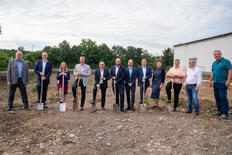- Construction of the facility in Budenheim, Germany, started and is set to open in summer 2025.
- The site will produce low-iridium-loaded catalyst coated membranes and Celtec® membrane electrode assemblies.
- The project is developed with Trigona Fuel Cell Components GmbH and Grundstücksverwaltung Rheinufer GmbH & Co KG.
- The facility will support the global energy transition by producing green hydrogen from water electrolysis.

Facility Construction and Production
BASF Environmental Catalyst and Metal Solutions (ECMS) has begun constructing its first advanced production facility for green hydrogen and fuel cell components in Budenheim, Germany, near Frankfurt. The facility will produce low-iridium-loaded catalyst coated membranes (CCMs) for proton exchange membrane (PEM) water electrolysis and Celtec® membrane electrode assemblies (MEAs) for high-temperature fuel cells. MEAs are essential for converting hydrogen and oxygen into electricity efficiently.
Global Hydrogen Business
ECMS operates its hydrogen business globally, with activities in Europe, North America, and Asia. As the renewable energy ecosystem grows, green hydrogen production from water electrolysis will become vital for the global energy transition. The new facility will enable the commercial launch of newly developed CCMs for PEM electrolyzers with multi-gigawatt capacity, serving the global market.
Project Development and Timeline
The Budenheim site is scheduled to open in the summer of 2025. The facility is located on an industrial site within the Rhein-Main metropolitan area in central Europe. The project is being developed in collaboration with Trigona Fuel Cell Components GmbH and Grundstücksverwaltung Rheinufer GmbH & Co KG.

